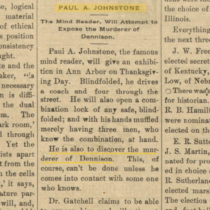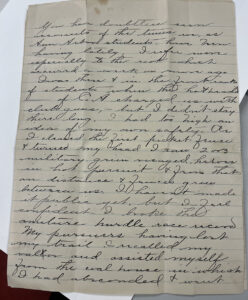Magazine

A Riot, a Murder, and a Psychic
After a U-M student was killed in 1890, a psychic visited town claiming to be able to name the murderer.
By Lara Zielin
June Mage fled on foot, fearing for his safety.
On November 12, 1890, the young U-M law student ran from members of the state militia who had turned their weapons on a group of unarmed students.
In a letter to his friend William Joseph Fischer, Mage wrote that not everyone was as lucky as he was to escape. “One student who was struck with the butt end of the gun over the right eye died about five o’clock the next morning.”
That was Irving Dennison, a first-year student from Toledo. His death caused an uproar in the student body—and beyond. Who was the militiaman who had struck him? A Michigan Daily headline described the assailant as “short and thick-set.” One student testified that the murderer was a guard. “I think he had on a cap. I think he was in uniform.” But it wasn’t enough to lead to any initial arrests.
Then, on November 24, 1890, The Michigan Daily announced the arrival of Paul A. Johnstone. According to the paper, the “famous mind reader” would “give an exhibition on Thanksgiving Day,” during which he would “discover the murderer of Dennison.”

June Mage’s letter documents an attack on unarmed students in 1890 by state militia members.
He would also, according to the paper, drive a coach and four horses blindfolded through the streets, and open a combination lock to any safe—also blindfolded.
The paper noted that Dr. Charles Gatchell would also be in attendance. A physician on the faculty of what was then U-M’s Homeopathic College of Medicine, Gatchell said he would be able to reveal Johnstone for the fraud he was and “expose him.”
The Daily didn’t report on what happened at the so-called mind-reading exhibition, but certainly no arrests were made immediately afterward. However, by May 1891, the Columbus Daily Telegram reported that several men had been arrested for Dennison’s murder. Due to insufficient evidence, the Washtenaw County prosecutor eventually dropped all charges.
Johnstone, for his part, kept up his mind-reading act, even claiming to be able to find a hatpin hidden in the long, complex underground systems of Wind Cave, South Dakota. The stunt, performed in 1893, made headlines when Johnstone and his crew were lost for multiple days within the cave system. Accounts of the stunt varied widely, but some newspapers reported that Johnstone was, in fact, able to find the hatpin.
In the end, perhaps Dr. Gatchell’s skepticism had some influence: Johnstone became a medical doctor and practiced in Kansas City, Missouri, before his death in 1941.
Sources for this story include: June Brutus Mage collection. The Michigan Daily: November 15 and 24, 1890. McCormick, Dave: “The Forgotten Riot,” the Ann Arbor Observer, March 28, 2022. Farrell, Tom: “A Mind Reader, a Pin Head, and a Fool; The Story of ‘Professor’ Johnstone’s Visit to Wind Cave,” April 1988.
